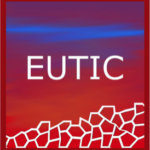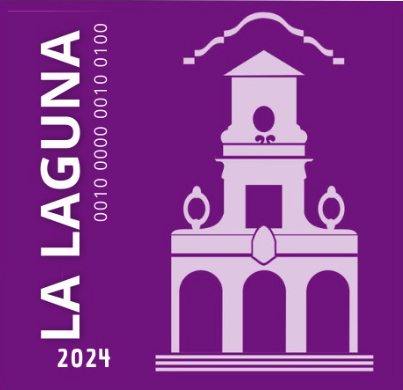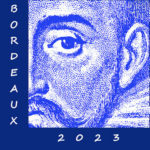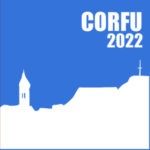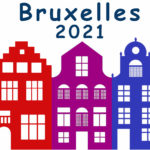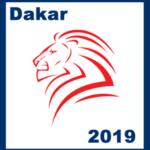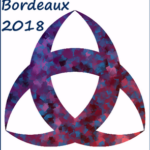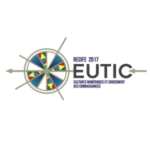In the Intersection of Art, Science and Technology: Dialogos between Humans and Machines
A series of relatively recent transformative events has rapidly, and in some cases violently, embedded and institutionalized technological advances across a vast spectrum of societal exchanges and structures. These contemporary radical changes occur in the intersection of well-established artificial dualities and distinctions (including the digital, the analog, the tangible, the virtual, the hybrid, the human, the machine), re-inventing proximities and re-defining beings and identities. The boundaries of the status quo of various systems have been challenged. The boundaries of some systems become permissible and flexible enough for the systems to survive and afford the novelty, whilst the inertia of other systems prevents them from successfully adapting.
In EUTIC 2022, the focus is on the transformations that occur in the intersections of Art, Science and Technology. At the crux of these transformations lie the practices of communicating and linking, rather than merging, distinctions. For example, the technological advancements further facilitated interdisciplinarity and transdisciplinarity, thus maximising the potential for theorizing and applying, for modelling and problem solving. In art, AI and robotics allow the creations to be creators, to develop aesthetics, to be subjected to human art criticism and emotions. At the same time, the boundaries between the human and the machine are also being re-defined at a biological level, questioning, for example, the notion of (dis)ability. The radically transformed lived present is echoed in scientific and in dystopic or utopic art productions, thus bringing to the fore wide discussions about nature, culture, ethics, the human, the machine, the posthuman, the cyborg, the organic, the inorganic, the individual, the collective. In education, aspects of these transformation are echoed in approaches like ST(R)E(A)M and inclusive educational practices, thus contributing to their incorporation within the constituting factors of the contemporary and future societal structures.
EUTIC 2022 embraces transformative change by providing a communicational space within which fruitful exchanges of different perspectives may occur. Dialogos seems to be fundamental in promoting this idea. Dialogos refers to the act of conversation, deriving from the Greek words dia and logos. Dia means through, suggesting motion, movement and directedness. Logos refers to discourse, but its use and meanings span across the Greek language as it is linked with diverse societal practices and processes, including reasoning, logic and rationale. For example, in the ancient polis the citizen was a ‘subject’ to the logos (ypologos), i.e. the common, public argued meaning. Isocrates stresses that “because there has been implanted in us the power to persuade each other and to make clear to each other whatever we desire […] we have come together and founded cities and made laws and invented arts” (Isoc. To Nicocles 3.6). Hence, dialogos essentially widens the boundaries to become the space that enables the communication and co-existence of distinct others (disciplines, beings, structures), thus allowing the multi-directional communicational exchanges of diverse constituting communities, practices, signs and meanings.
In this sense, we invite contributions that consider the dialogos of the human and the machine in the intersections of Art, Science and Technology, including the following non-exhaustive topics:
- Aesthetics of science and technology
- Interculturality and digital ecosystems
- Algorithms and intelligence in arts and in education
- Mediatised communication and its new forms
- The study of processes and ethics
- Socio-economic changes and collective intelligence
- Communication and management of the digital transition
- Training for digital uses and dynamics of development
- Outsourcing of resources, cloud computing, open data, open archives
- Life with algorithms and digital conditioning
- Digital exclusion and digital-illiteracy
- (Dis)ability, e-health, prosthetics, bionics
- Cyborgs and humanity
- History and culture of the cyborg
- Cyborgs, goddesses and identity
- Gaming, cyborgs and digital narration
- Killer robots and digital dehumanization
- Love, intimacy and romantic robots
- Emotional machines
- Connected objects, augmented reality, transhumanism
- AI, gender and design
- Digital persuasion, digital makeup and deepfakes
- Territorially smart uses of digital technologies
- ICT in ecology and climate change
- Digital ecosystems, eco-digital culture and eco-communication
- Mind uploading
- Science and fiction in the AI era
- New skills for the digital world
Contributions
The contributions can be presented in various formats:
Oral Presentation: 15 minutes Oral presentation with a PowerPoint visual aid, followed by 5 minutes of discussions per presentation.
Symposium: Session of 90 minutes organized by one or several contributors on a theme, comprising numerous oral presentations (maximum of 5 participants including the applicant). The applicant must contact the participants of their choice in order that they take part in the same symposium.
Workshop: The workshop, organized in a 90 minutes session, is a space for sharing experiences and ideas. The participants are engaged to contribute to a collective piece of work on a given theme. The workshop organizer presents the theme and ensures the participation of at least two contributors.
Proposals for presentations should be written in either English or French. The proposals should be sent in the form of extended abstract (title, 5 keywords) of 700 to 1200 words including bibliography/ references. In the Easychair submission form, you will need to select at least one and up to three topics your proposal addresses.
Accepted proposals may be subject to modifications or revisions requested by the Scientific Committee. All accepted proposals will be published in the conference proceedings in digital format, provided that the author or one of the authors is registered and present at the conference. For submitting proposals for workshops or symposia (duration 90 minutes), please contact the Organizing Committee at the address: eutic@inarts.eu.
Proposals should be submitted no later than July 12, 2022, via Easychair:
https://easychair.org/conferences/?conf=eutic2022
Instructions for authors including information about the length and the format of the full text paper will be provided in the Author’s Area of the website in due time.
